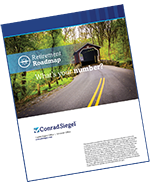Sources of Retirement Income
Whether your retirement is in sight or many years off, taking the time to consider your sources of income during retirement can alleviate some of the burden in planning for retirement. Here are some of the most common sources of retirement income:
1. Social Security

Your Social Security benefit depends on how much you earned during your working career and the age at which you plan to retire. The best age to start receiving retirement benefits is highly personal and depends on a number of factors, such as your current cash needs, your health and family longevity, whether you plan to work in retirement, whether you have other retirement income sources, your anticipated future financial needs and obligations, and, of course, the amount of your future Social Security Benefit. Preferably, you should talk to a representative at your local Social Security office in the year prior to your retirement and it may be to your advantage to have your benefits start in January, even if you are planning on retiring later in that particular year.
2. Employer Retirement Plan(s)
There are several major types of employer retirement plans. Most can be categorized as either Defined Benefit Pension Plans or Defined Contribution retirement plans.
A defined benefit pension plan, better known as a traditional pension plan, is a promise of monthly income at retirement age, paid from a plan maintained by your employer. These benefits can vary significantly by employer and recently, this type of benefit has become less prevalent. Most pensions are not designed to replace your full pre-retirement income; rather, they are used to supplement Social Security and personal savings (e.g. through a 401(k), IRA, etc.).
If you have a 401(k), 403(b), profit sharing, money purchase, or employee stock ownership plan, you have what is known as a “defined contribution retirement plan.” This type of plan is different in that there is no promise of a set level of monthly benefit. Your benefit is determined by your account balance at retirement, which in turn is determined by any contributions that you or your employer make and the investment results on those contributions.
3. Individual Retirement Accounts (IRAs)
An IRA is very similar to a defined contribution retirement plan, except that it is a plan that you establish on your own, not tied to your employer. You can fund this with periodic contributions or rolling in money from certain employer retirement plans. You control the investments in an IRA.
4. Home Ownership
Many people count on their homes as retirement assets. Historically, despite intermittent run-ups in home prices, the value of real estate has increased at a rate that is only marginally better than inflation. Also, when viewed purely as an investment, over-investing in a house diverts funds that could potentially earn higher long-term returns elsewhere. While your home can still be a source of funds for your retirement under some circumstances, in the end it pays to think of our home as more of a lifestyle choice, rather than as a true retirement asset or investment.
5. Other Personal Assets, Savings, etc.
Other assets that may be used to fund retirement may include such things as an inheritance, collectibles other investments/savings, etc.
6. Part-time Employment
Many retirees want to continue to work, even for reasons other than supplementing income. Some prefer to phase into retirement rather than transition all at once, some want to pursue a second career, and some want to work because they enjoy it. But all retirees should consider leaving enough time for other activities.
Thinking about retirement as a goal for 2022? Check out our Retirement Roadmap to make sure you’re on the right path!
All investment advisory services and fiduciary services are provided through Conrad Siegel Investment Advisors, Inc. (“CSIA”), a fee-for-service investment adviser registered with the U.S. Securities and Exchange Commission which operates in a fiduciary capacity for its clients. Investing in securities involves the potential for gains and the risk of loss and past performance may not be indicative of future results. Any testimonials do not refer, directly or indirectly, to CSIA or its investment advice, analysis or other advisory services.

